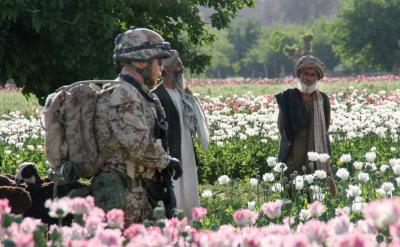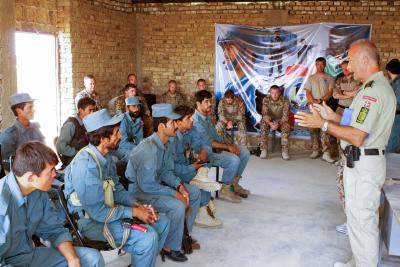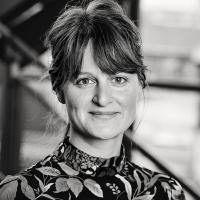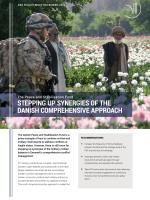Stepping up synergies of the Danish comprehensive approach

The Danish Peace and Stabilisation Fund is a prime example of how to combine civilian and military instruments to address conflicts in fragile states. However, there is still room for stepping up synergies of the military-civilian balance in Denmark’s comprehensive conflict management.
■ Synergies between civilian and military instruments should take place through complimentary-but-separate interventions.
■ Take PSF instruments into account when planning Denmark’s broader engagement in conflicts to ensure a more comprehensive security policy effort.
21st century conflicts are complex. Asymmetrical warfare, cyber-attacks and transborder crime have largely replaced conventional war. Accordingly, modern conflict management aims to combine civilian, economic, political and military actions as complementary instruments to stabilise conflicts. This multi-dimensional policy approach is called the ‘comprehensive approach’. The comprehensive approach has been a treasured norm in Danish stabilisation efforts since the early 2000s. In 2010, it became formally consolidated with the Peace and Stabilisation Fund (PSF), offering a new tool for Danish foreign and security policy.
The PSF works at the intersection of development and security in fragile states, primarily through regional programmes. PSF activities of a civilian nature are carried out by the Ministry of Foreign Affairs (MFA), and those of a military nature by government bodies under the auspices of the Ministry of Defence (MoD). The PSF is co-funded by resources from the two institutions.
The PSF organisation seeks to ensure common goals, increase synergies and reduce duplication. At the strategic level, an inter-ministerial steering committee oversees PSF programmes. Comprising high-level officials from the MFA, the MoD, the Ministry of Justice and the Prime Minister’s office, it approves and monitors PSF programmes and appropriations. It is supported by a secretariat in the MFA to oversee the implementation of PSF programmes.
Increasing formal feedback
When it comes to formal feedback between the levels of strategic planning and policy implementation, the PSF steering committee receives programme progress reports annually or semi-annually – feedback may be more frequent if there are challenges in the field, or if implementation takes place in a region with heightened political attention.
To harvest the benefits of long-term stabilisation efforts abroad and inter-ministerial coordination at home, PSF activities and instruments should be taken into account when Denmark engages in conflicts using other policy instruments.
There is no formalised feedback between status reports. This does not mean that no feedback occurs. But it is ad hoc. This approach is beneficial in that it allows flexibility in implementation and avoids wasting resources on redundant coordination.
However, the lack of formalised and regular feedback between status reports is also a fragile dimension of the PFS. As military advisors are embedded in local security structures, they are able to monitor the results of Danish activities directly. Shorter-term deployments, e.g. of Special Forces, also acquire a detailed understanding of the field through their engagement with local security actors. However, as things stand, local knowledge risks evaporating before relevant parts of the organisation can learn from it, because feedback has no formal institutional anchorage and is dependent on the personal relationships and networks of the actors involved.
Increasing formalised feedback structures across the levels of strategy and implementation within the PSF could strengthen the intended benefits of the comprehensive approach by capturing vital knowledge of the field for the benefit of changing personnel and future programming. While writing additional progress reports is a resource-heavy exercise and therefore not recommended, feedback could include regular meetings between all levels of policy and structured debriefing of returning personnel.
Keeping instruments complimentary-but-separate
Because the PSF framework is comprehensive, it facilitates an environment in which programmes can draw on the benefits of the working methods used in different governmental agencies. For instance, it has proven useful that the Danish Defence deploys its own military advisors, rather than channelling resources through third-party engagements, which civilian government bodies often rely on in fragile states. Military advisors are an effective means to gain access to central security structures and build relationships with local authorities for the benefit of the entire programme. Likewise, it is useful for the MFA to have access to MoD funds, because their use comes with fewer caveats than the MFA’s resources counting as specifically financing development interventions (DAC resources). Finally, PSF programme planning, implementation and evaluation, takes place through systematised processes used by the MFA, which lends Danish military interventions within the PSF a thorough and context-sensitive approach.

However, when civilian and military policy tools are systematically combined, the boundaries between the two become blurred. This gives rise to two challenges in particular. First, it risks securitising civilian instruments. Indeed, PSF programmes solely target the capacity-building of security-related institutions. By approaching challenges such as migration in the Sahel or maritime piracy in Somalia through a stabilisation lens, it risks defining such challenges as security matters rather than as spoilers of development. As such, stabilisation efforts may not sufficiently address the root causes of global challenges. To be sure, migration cannot be solved by enhancing security structures alone: attention should also be paid to creating sustainable livelihoods for latent refugees.
Second, the blurring of civil–military boundaries risks diluting political decision-making processes that govern the deployment of Danish armed forces. Conventionally, Danish military forces are deployed abroad through parliamentary deliberation. The Danish Constitution section 19(2) states that the Danish defence forces shall not use military force against a foreign state without parliamentary consent. Since PSF activities do not involve the use of force, they do not need a political mandate but are instead approved by the inter-ministerial steering committee and, depending on the case, the Minister of Defence.
Nonetheless, this process implies that PSF programmes allow de facto deployment of active military personnel abroad without a parliamentary mandate or the involvement of other ordinary political structures, such as the Foreign Policy Committee. Examples of this include how PSF programmes use military personnel to train AMISOM troops in East Africa and have sent Special Forces to train security actors in Nigeria and Cameroon. While this is training that does not involve the use of force, there are similar examples of Danish forces conducting training exercises abroad outside the PSF programme but with a parliamentary mandate, e.g. Operation Inherent Resolve in Iraq and Syria. This makes it unclear what types of deployment are subject to parliamentary debate.

The blurring of civilian and military instruments is not a direct concern for the way the PSF organises its activities today, and both civil and military instruments are important in creating sustainable peace. Yet the risks associated with it make it necessary to consider carefully the distinct objectives and outcomes of each policy tool within the PSF. Synergies between instruments should take place through complimentary-but-separate interventions, not by merging them into one.
Connecting PSF to broader conflict management
Making Danish conflict management ‘comprehensive’ is an increasing strategic priority. Here, the PSF is an attractive policy tool. Indicating a political appetite to use the PSF, in the 2018-2023 Defence Agreement it was decided to raise the MoD’s contribution to the PSF from DKK 84M in 2017 to DKK 150M in 2023, a 75% increase. This will raise the PSF annual budget .from ca. DKK 400M to 475M in 2023. However, this will not alter the fact that the PSF still constitutes a small portion of Denmark’s collected stabilisation efforts and remains merely one instrument among many.
One advantage of the PSF is the relatively long-term time-frame of its programmes compared to other Danish activities in fragile states. Programmes are locked into three years engagements and therefore not immediately dependent on shifting political priorities. The PSF may thus foster and sustain access and engagement in complex crises that need continued support to make an impact.
However, the PSF is not formally linked to broader Danish engagements in fragile states. It runs in a separate track from both Danish military deployment and Danida programming. The PSF and other interventions may therefore end up competing for already scarce resources, instead of creating synergies. To harvest the benefits of long-term stabilisation efforts abroad and inter-ministerial coordination at home, PSF activities and instruments should be taken into account when Denmark engages in conflicts using other policy instruments. This is particularly pertinent at a time when a small state as Denmark must carefully prioritise resources and harmonise its efforts.
DIIS Experts




